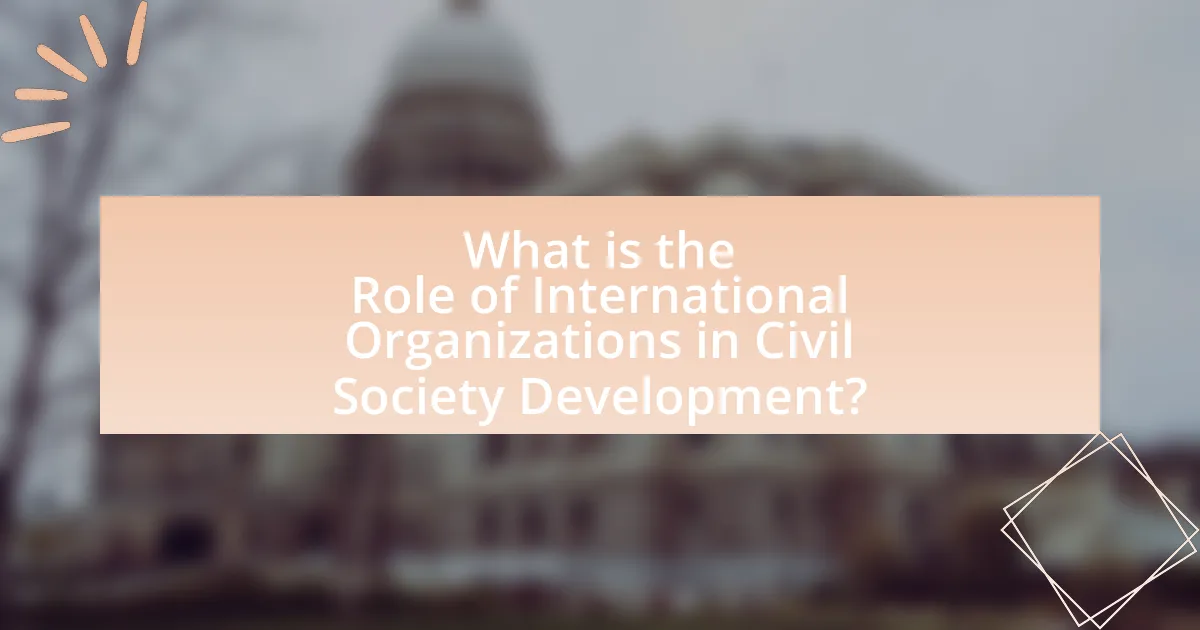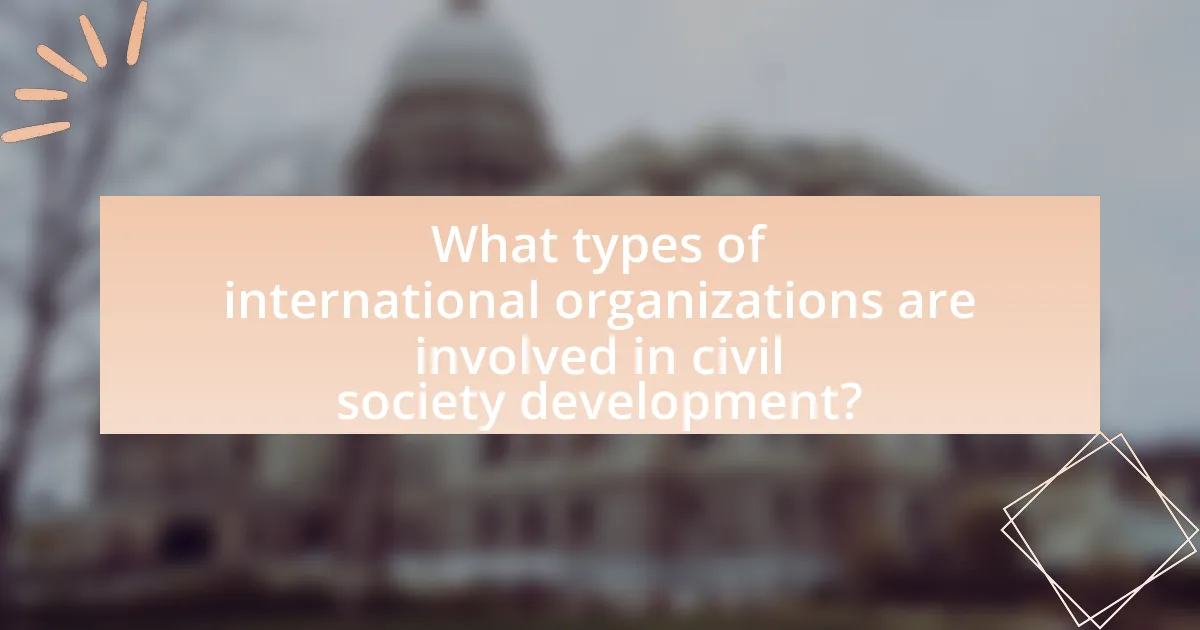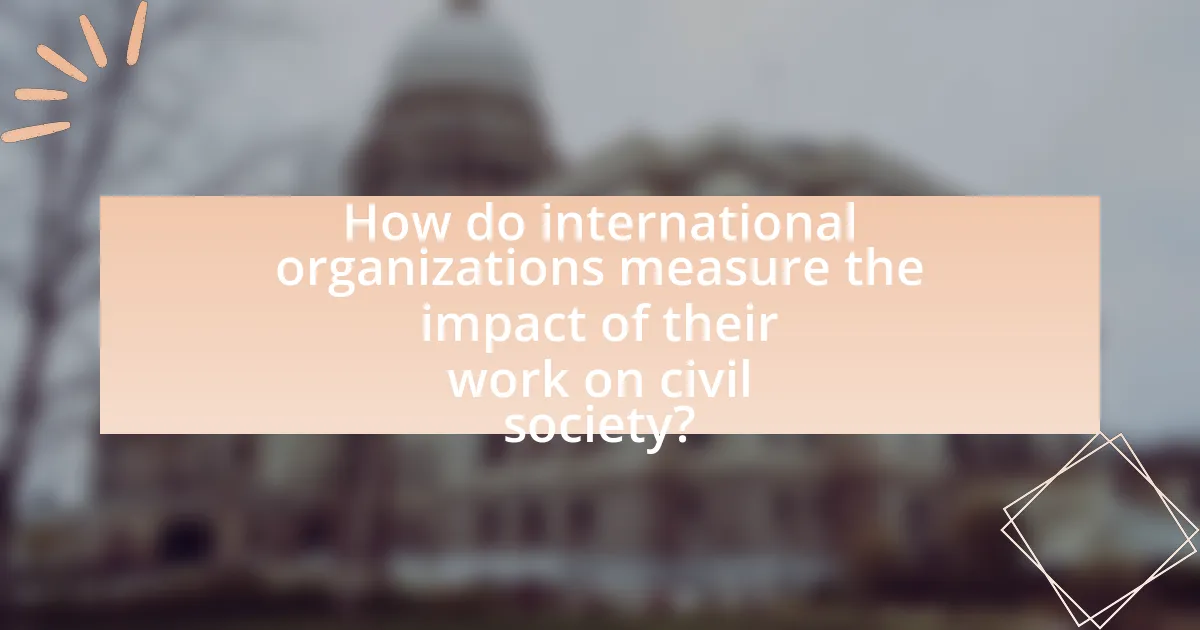International organizations, such as the United Nations and the World Bank, play a vital role in the development of civil society by providing resources, expertise, and frameworks that empower local communities. They contribute through funding, capacity building, and advocacy, enhancing the effectiveness of civil society actors and promoting democratic governance. The article explores the specific functions of these organizations, their engagement with local civil society, and the importance of civil society development for global governance. It also addresses the challenges faced by non-governmental organizations and governmental bodies, as well as the metrics used to measure the impact of civil society initiatives. Finally, it highlights best practices for international organizations to effectively support civil society development in response to emerging global challenges.

What is the Role of International Organizations in Civil Society Development?
International organizations play a crucial role in civil society development by providing resources, expertise, and frameworks that empower local communities and organizations. They facilitate capacity building through training programs, funding opportunities, and technical assistance, which enhance the effectiveness of civil society actors. For instance, the United Nations Development Programme (UNDP) has implemented initiatives that strengthen governance and promote civic engagement, leading to increased participation in democratic processes. Additionally, international organizations often advocate for policy changes that support civil society, as seen in the work of the World Bank, which emphasizes the importance of civil society in sustainable development strategies. These actions collectively contribute to a more vibrant and resilient civil society, fostering social cohesion and accountability.
How do international organizations contribute to civil society development?
International organizations contribute to civil society development by providing funding, technical assistance, and capacity-building initiatives. These organizations, such as the United Nations and the World Bank, often allocate resources to support non-governmental organizations (NGOs) and community-based groups, enabling them to enhance their operational capabilities and advocacy efforts. For instance, the United Nations Development Programme (UNDP) has invested in programs that strengthen local governance and empower marginalized communities, which fosters greater civic engagement and participation. Additionally, international organizations facilitate knowledge sharing and best practices through workshops and conferences, which further equips civil society actors with the necessary tools to address social issues effectively.
What specific functions do these organizations perform in civil society?
International organizations perform several specific functions in civil society, including advocacy, capacity building, and resource mobilization. Advocacy involves promoting human rights, social justice, and democratic governance, which helps to influence policy and public opinion. Capacity building focuses on strengthening local organizations and communities by providing training, technical assistance, and knowledge sharing, thereby enhancing their ability to address social issues effectively. Resource mobilization entails securing funding and support for civil society initiatives, enabling organizations to implement projects that address community needs. These functions are essential for fostering a vibrant civil society that can engage in dialogue, promote accountability, and drive social change.
How do international organizations engage with local civil society actors?
International organizations engage with local civil society actors primarily through partnerships, capacity building, and funding initiatives. These organizations often collaborate with local groups to enhance their effectiveness in addressing social issues, leveraging local knowledge and networks. For instance, the United Nations Development Programme (UNDP) frequently works with local NGOs to implement community development projects, ensuring that local voices are included in decision-making processes. This engagement is supported by evidence showing that local civil society actors can significantly improve project outcomes, as highlighted in the World Bank’s report on civil society engagement, which states that projects involving local stakeholders are 30% more likely to succeed.
Why is civil society development important for global governance?
Civil society development is crucial for global governance because it enhances democratic participation and accountability. Strong civil societies empower citizens to engage in decision-making processes, ensuring that diverse voices are heard and considered in governance. For instance, the World Bank emphasizes that civil society organizations contribute to better governance by advocating for transparency and holding governments accountable, which leads to more effective policy implementation. Furthermore, research by the United Nations Development Programme highlights that civil society plays a vital role in promoting human rights and social justice, which are foundational elements for sustainable global governance.
What impact does a strong civil society have on democratic processes?
A strong civil society positively impacts democratic processes by fostering citizen engagement, accountability, and advocacy for rights. Civil society organizations mobilize individuals, encouraging participation in political discourse and decision-making, which enhances democratic legitimacy. For instance, research by the World Bank indicates that countries with robust civil societies experience higher levels of voter turnout and public trust in government institutions. Additionally, civil society acts as a watchdog, holding governments accountable and ensuring transparency, which is essential for the functioning of democracy. This accountability is evidenced by the role of organizations like Transparency International in combating corruption and promoting good governance.
How does civil society development influence policy-making at the international level?
Civil society development significantly influences policy-making at the international level by enhancing advocacy, promoting accountability, and facilitating dialogue among stakeholders. Civil society organizations (CSOs) mobilize public opinion and provide expertise, which can shape international norms and policies. For instance, the involvement of CSOs in the United Nations Framework Convention on Climate Change has led to increased transparency and the incorporation of diverse perspectives in climate agreements. Research by the World Bank indicates that countries with robust civil societies are more likely to adopt policies that reflect the needs and rights of their citizens, demonstrating a direct correlation between civil society engagement and effective policy outcomes.

What types of international organizations are involved in civil society development?
International organizations involved in civil society development include non-governmental organizations (NGOs), intergovernmental organizations (IGOs), and multilateral development banks. NGOs, such as Amnesty International and Oxfam, focus on advocacy and grassroots mobilization to empower communities. IGOs, like the United Nations and the World Bank, provide funding, technical assistance, and policy frameworks to support civil society initiatives. Multilateral development banks, such as the Asian Development Bank, finance projects that enhance civil society’s capacity to engage in governance and development processes. These organizations collectively contribute to strengthening civil society by promoting democratic governance, human rights, and social justice.
What roles do governmental organizations play in civil society?
Governmental organizations play a crucial role in civil society by providing regulatory frameworks, funding, and support for civic initiatives. They establish laws and policies that shape the operational environment for civil society organizations, ensuring accountability and transparency. For example, governmental bodies often allocate public funds to support non-profit organizations, enabling them to carry out social programs and community services. Additionally, these organizations facilitate partnerships between the government and civil society, promoting collaboration on issues such as public health, education, and human rights. This interaction enhances civic engagement and empowers citizens to participate in democratic processes, thereby strengthening the overall fabric of civil society.
How do intergovernmental organizations support civil society initiatives?
Intergovernmental organizations support civil society initiatives by providing funding, technical assistance, and platforms for dialogue. For instance, the United Nations Development Programme (UNDP) allocates resources to empower local NGOs and community-based organizations, facilitating their participation in governance and development processes. Additionally, organizations like the World Bank offer grants and capacity-building programs aimed at enhancing the effectiveness of civil society in addressing social issues. These efforts are evidenced by the UNDP’s commitment to the Sustainable Development Goals, which explicitly recognize the importance of civil society in achieving global development objectives.
What are the limitations of governmental organizations in this context?
Governmental organizations face several limitations in the context of civil society development. These limitations include bureaucratic inefficiencies, which can hinder timely decision-making and responsiveness to community needs. Additionally, governmental organizations often operate under strict regulatory frameworks that may restrict their ability to innovate or adapt to changing circumstances. Furthermore, a lack of resources and funding can limit their capacity to implement effective programs, as evidenced by the World Bank’s report indicating that many governments allocate less than 1% of their GDP to civil society initiatives. Lastly, political influences can skew priorities, leading to a misalignment between governmental actions and the actual needs of civil society, as highlighted in various studies on governance and public policy.
What is the role of non-governmental organizations (NGOs) in civil society development?
Non-governmental organizations (NGOs) play a crucial role in civil society development by advocating for social change, providing essential services, and promoting civic engagement. They often fill gaps left by government and private sectors, addressing issues such as poverty, education, and human rights. For instance, according to the World Bank, NGOs contribute significantly to community development by implementing projects that empower marginalized groups and enhance local governance. Their ability to mobilize resources and foster partnerships further strengthens civil society, enabling more effective responses to societal challenges.
How do NGOs collaborate with international organizations?
NGOs collaborate with international organizations through partnerships, funding, and knowledge sharing. These collaborations often involve joint projects aimed at addressing global issues such as poverty, health, and education. For instance, NGOs may receive grants from international organizations like the United Nations to implement specific programs, thereby leveraging the resources and expertise of these larger entities. Additionally, NGOs contribute local insights and grassroots perspectives that enhance the effectiveness of international initiatives, as seen in programs like the UN’s Sustainable Development Goals, where local NGOs play a critical role in community engagement and implementation.
What challenges do NGOs face in civil society development?
NGOs face several challenges in civil society development, including funding constraints, political instability, and regulatory barriers. Funding constraints limit their ability to implement programs effectively, as many NGOs rely on donations and grants that can fluctuate. Political instability often hinders their operations, as changing governments may impose restrictions or lack support for civil society initiatives. Regulatory barriers, such as complex registration processes and compliance requirements, can impede NGOs from functioning efficiently. According to a report by the World Bank, over 70% of NGOs cite funding as a primary challenge, highlighting the critical impact of financial resources on their effectiveness in civil society development.

How do international organizations measure the impact of their work on civil society?
International organizations measure the impact of their work on civil society through a combination of quantitative and qualitative assessments. They utilize surveys, interviews, and focus groups to gather data on community engagement, social change, and the effectiveness of programs. For instance, the United Nations Development Programme (UNDP) employs indicators such as the Human Development Index and specific project evaluations to assess improvements in civil society’s capacity and participation. Additionally, organizations often analyze policy changes and advocacy outcomes to determine their influence on civil society dynamics. These methods provide concrete evidence of the organizations’ contributions to enhancing civic engagement and social cohesion.
What metrics are used to evaluate civil society development?
Metrics used to evaluate civil society development include the level of civic engagement, the strength of civil society organizations, and the effectiveness of advocacy efforts. Civic engagement is measured through participation rates in community activities, voting, and public consultations. The strength of civil society organizations is assessed by their capacity, sustainability, and the diversity of their funding sources. Effectiveness of advocacy efforts can be evaluated by the impact of campaigns on policy changes and social outcomes. These metrics provide a comprehensive framework for understanding the health and influence of civil society in promoting democratic governance and social justice.
How do these metrics inform future strategies of international organizations?
Metrics inform future strategies of international organizations by providing data-driven insights that guide decision-making and resource allocation. For instance, organizations like the United Nations utilize metrics such as the Human Development Index and poverty rates to assess the effectiveness of their programs and identify areas needing improvement. This quantitative analysis enables organizations to tailor their initiatives to better address the specific needs of civil society, ensuring that interventions are relevant and impactful. Furthermore, metrics allow for the evaluation of past strategies, facilitating adjustments based on what has been successful or unsuccessful, thereby enhancing the overall effectiveness of international efforts in civil society development.
What are the challenges in measuring the impact of civil society initiatives?
Measuring the impact of civil society initiatives faces several challenges, primarily due to the complexity of social change and the difficulty in establishing clear causal relationships. Civil society initiatives often operate in multifaceted environments where numerous factors influence outcomes, making it hard to isolate the effects of a specific initiative. Additionally, the lack of standardized metrics and evaluation frameworks complicates the assessment process, as different organizations may use varying criteria for success. Furthermore, qualitative impacts, such as changes in community attitudes or empowerment, are often harder to quantify than quantitative outcomes, leading to an incomplete understanding of an initiative’s effectiveness. These challenges are supported by research indicating that many civil society organizations struggle with evaluation due to resource constraints and a lack of expertise in impact measurement.
How do international organizations adapt to the changing landscape of civil society?
International organizations adapt to the changing landscape of civil society by engaging in collaborative partnerships, leveraging technology, and responding to emerging social movements. These organizations recognize the need for flexibility and responsiveness to the evolving needs and priorities of civil society actors. For instance, the United Nations Development Programme (UNDP) has increasingly focused on inclusive governance and participatory approaches, which reflect the demands of grassroots organizations and local communities. Additionally, international organizations utilize digital platforms to enhance communication and mobilization, as seen in initiatives like the Global Partnership for Effective Development Cooperation, which emphasizes the importance of stakeholder engagement in development processes. This adaptability is crucial for maintaining relevance and effectiveness in addressing global challenges.
What strategies do they employ to remain relevant and effective?
International organizations employ strategies such as adaptive governance, stakeholder engagement, and capacity building to remain relevant and effective in civil society development. Adaptive governance allows these organizations to respond to changing political, social, and economic contexts, ensuring their initiatives align with current needs. Stakeholder engagement fosters collaboration with local communities, governments, and other entities, enhancing the impact of their programs. Capacity building focuses on empowering local organizations and individuals, equipping them with the skills and resources necessary for sustainable development. These strategies are supported by evidence showing that organizations like the United Nations Development Programme (UNDP) have successfully implemented them, resulting in improved governance and community resilience in various regions.
How do they respond to emerging global challenges affecting civil society?
International organizations respond to emerging global challenges affecting civil society by implementing targeted programs and initiatives that address specific issues such as human rights, environmental sustainability, and social inequality. For instance, organizations like the United Nations and the World Bank develop frameworks and policies that promote civic engagement and empower local communities to tackle these challenges effectively. Evidence of their impact can be seen in initiatives like the UN’s Sustainable Development Goals, which aim to eradicate poverty and promote social justice globally, demonstrating a structured approach to enhancing civil society’s resilience against emerging threats.
What best practices can international organizations adopt for effective civil society development?
International organizations can adopt several best practices for effective civil society development, including fostering inclusive participation, providing capacity-building support, and ensuring transparent funding mechanisms. Inclusive participation involves engaging diverse stakeholders, including marginalized groups, to ensure that civil society reflects the community’s needs and perspectives. Capacity-building support enhances the skills and resources of civil society organizations, enabling them to operate effectively and sustainably. Transparent funding mechanisms build trust and accountability, allowing organizations to utilize resources efficiently and responsibly. These practices are supported by evidence from various studies, such as the 2018 report by the United Nations Development Programme, which highlights the importance of inclusive approaches and capacity building in strengthening civil society.